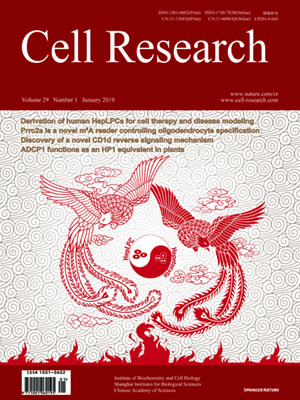
Volume 29, No 1, Jan 2019
ISSN: 1001-0602
EISSN: 1748-7838 2018
impact factor 17.848*
(Clarivate Analytics, 2019)
Volume 29 Issue 1, January 2019: 67-79
ORIGINAL ARTICLES
Induction of OTUD4 by viral infection promotes antiviral responses through deubiquitinating and stabilizing MAVS
Tianzi Liuyu 1,2, Keying Yu 1,2, Liya Ye 1,2, Zhidong Zhang 1,2, Man Zhang 1,2, Yujie Ren 1,2, Zeng Cai 1,2, Qiyun Zhu 3, Dandan Lin 4 and Bo Zhong 1,2
1College of Life Sciences, Wuhan University, Wuhan 430072, China; 2Medical Research Institute, School of Medicine, Wuhan University, Wuhan 430071, China; 3State Key Laboratory of Veterinary Etiological Biology, Lanzhou Veterinary Research Institute, Chinese Academy of Agricultural Sciences, Lanzhou 730046, China and 4Cancer Center, Renmin Hospital of Wuhan University, Wuhan 430060, China
Correspondence: Bo Zhong (zhongbo@whu.edu.cn)
The activity and stability of the adapter protein MAVS (also known as VISA, Cardif and IPS-1), which critically mediates cellular antiviral responses, are extensively regulated by ubiquitination. However, the process whereby MAVS is deubiquitinated is unclear. Here, we report that the ovarian tumor family deubiquitinase 4 (OTUD4) targets MAVS for deubiquitination. Viral infection leads to the IRF3/7-dependent upregulation of OTUD4 which interacts with MAVS to remove K48-linked polyubiquitin chains, thereby maintaining MAVS stability and promoting innate antiviral signaling. Knockout or knockdown of OTUD4 impairs RNA virus-triggered activation of IRF3 and NF-κB, expression of their downstream target genes, and potentiates VSV replication in vitro and in vivo. Consistently, Cre-ER Otud4fl/fl or Lyz2-Cre Otud4fl/fl mice produce decreased levels of type I interferons and proinflammatory cytokines and exhibit increased sensitivity to VSV infection compared to their control littermates. In addition, reconstitution of MAVS into OTUD4-deficient cells restores virus-induced expression of downstream genes and cellular antiviral responses. Together, our findings uncover an essential role of OTUD4 in virus-triggered signaling and contribute to the understanding of deubiquitination-mediated regulation of innate antiviral responses.
https://doi.org/10.1038/s41422-018-0107-6
FULL TEXT | PDF
Browse 1200


